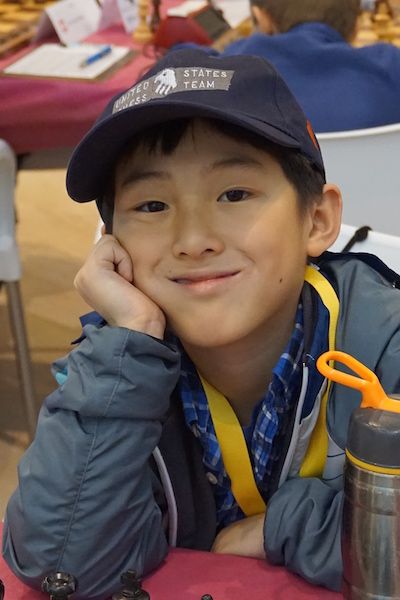
Niemann-Wang Team Dominates 1st ChessKid Games
The inaugural ChessKid Games took place Saturday and the duo of IM Hans Niemann and Alexander Wang cruised to victory with 39.0 out of a possible 48 points over the three disciplines. The commanding margin of victory was an astounding seven points and was thanks in large part to Niemann doing a "Fischer" by winning his final 20 matchups after an initial loss in the opening game.
The winning pair bested nine other teams, who were similarly composed of FIDE titled teenagers plus invited juniors aged 10 or under (full qualification rules here). With the victory, Niemann becomes the first qualifier for the 2020 Junior Speed Chess Championship, while Wang's biggest prize is three hours of lessons with the top-30 player and 2018 U.S. champion GM Sam Shankland.
Wang is still only nine years old and also just made USCF expert (2000), so he's having quite a few weeks.

The teams of IM Craig Hilby/Dhruva Patil (Team Dhruvaat5) and IM Joshua Sheng/Rachael Li (Team BalancedKarate) tied for second with 32.0 points each, but the latter officially won second place by virtue of having more black games in the blitz section. Both of those titled players win cash while the kids earn one extra lesson with their partner (all 10 kids also earned private lessons with their titled teenager partners, paid for by ChessKid.com).
Kids from seven countries competed: the U.S., UK, Netherlands, Denmark, Sweden, Argentina and Australia. The unofficial "ironman" (or is it "ironkid"?) award goes to the Aussie competitor Noah Rose. Still only eight years old, he began the event around 1 a.m. local time and watched a sunrise before the ChessKid Games finished. He turned in a very respectable fifth-place finish (with partner IM Brandon Jacobson).

The tournament was the first of its kind and experimented with three different formats. It replaced the old CONIC event, which was just for Americans and only featured classical chess. This new iteration began with three rounds of hand and brain (with the titled player as the brain), then moved on to puzzle duel, then finally the most familiar format, blitz.
Games in hand and brain counted for more than in the other sections since only three were played. So it looked bad when Team Niemann dropped the opening game and then went an exchange down in the second. Turns out, that was the only blemish on Niemann's individual card! Niemann and Wang went on to win the final two hand and brain games, then Niemann obliterated all nine opponents in puzzle duel, and also went 9-0 in blitz.
That's 20 straight wins; what took Fischer 137 days to do took Niemann half a day.

Wang claimed Bobby Fischer as his favorite player and he did more than enough to make the composite team score stand up. In his nine puzzle duels, he scored seven wins. And in the blitz, he added 6.0/9, which was plenty for first place.
Here's where the team got back on the right path—a comeback in game two to notch the win. Recall than Niemann was the "brain" (typing which piece to move) and Wang was the "hand" (required to move the piece that was typed).
In the above game, White was the team of Sheng and Li, and if they had converted the ending, that would have added four points to their final score (36.0) and reduced Niemann/Wang by the same margin (down to 35.0).
Li can still feel pretty good about her chess career—she is the highest-rated of all the kids who competed in the ChessKid Games (currently 2122 USCF; highest of any nine-year-old in the U.S.) She has a brother who is already a GM (Ruifeng Li, who couldn't participate due to taking college board exams), and she's already competed alongside Kasparov (2017 Ultimate Moves competition).
In the puzzle duel, the commentary team was able to broadcast the puzzle mastery of one player. As it turned out, Niemann, an avid streamer, offered to give ChessKid access to his screen. That was a great choice if you wanted to see puzzle acumen but a poor choice if you were prone to seizures. In the absence of any video proof otherwise, it may well be that Niemann is the fastest puzzle dueler in the world (but we invite Ray Robson and others to create a ChessKid account to challenge that!).
Niemann "copied" a technique from Chess.com's Puzzle Rush by doing so many puzzles in advance that he memorized many of them, which is completely legal. Chess is a meritocracy!

The most exciting of Wang's wins in the blitz was his opener, where he played a known idea in the Dragon, which gives away two rooks for the queen. Let's hope he also watched the ChessKid video on the same subject!
Wang also played a nice tactic later on. There is simply no good answer the seemingly benign 12. Ne5.
Niemann's perfection in the blitz wasn't without struggle. In four of the first five games, his king was under pressure and several times had to dance around the board. But in every case he survived. In one of the early wins, that meant giving back some sacrificed material and escaping into a worse rook ending, only to flag his opponent with a lone rook left on the board.
Here's some nifty defending where Niemann's king does the piece-trapping himself:
And here's Niemann getting to the enemy king first despite facing the early lunge 8. g4!?
ChessKid would like to thank all the players, their families, and the arbiters/proctors. There are already plans to simplify the format and expand the number of events next year to make regional ChessKid Games possible.
Here are the final standings:

To view the entire broadcast with hosts IM David Pruess (PlayfulSquirrel) and FM Mike Klein (FunMasterMike) you can watch parts one and two below.
Watch ChessKid Games with Funmaster Mike and IM David Pruess from Chess on www.twitch.tv
Watch 2019 FIDE World Fischer Random Championship Open Qualifier with Wouter Bik from ChesscomEvents on www.twitch.tv


